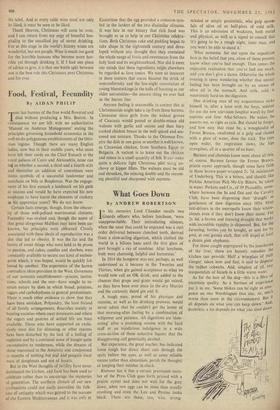Food, Festival, Fecundity
By AIDAN PHILIP THE last harems of the free world flowered and died without producing a Mrs. Becton. In consequence we are left with no authoritative `Manual on Anderun Management' stating the principles governing household economics in the well-to-do polygamous establishments of the Otto- man regime. Though there are many English ladies, now but in their middle years, who must have left their cards on the Chief Eunuch at the royal palaces of Cairo and Alexandria, none can ttaij us whether a second, a third and a fourth wife and thereafter an addition of concubines were status symbols of a successful landowner and merchant on Nile or Bosphorus. Was the engage- ment of his first eunuch a landmark on his path to success and would he have expected his new employee to have learnt the elements of cookery m his apprentice years? We do not know.
Certain facts emerge, though, from the obscur- ity of those well-policed matrimonial cloisters. Fecundity was exalted and, though the name of that great clergyman Malthus may have been un- known, his principles were abhorred. Closely associated with these ideals of reproduction was a diet that led to obesity. It was the fat and the lovers of sweet things who were held to be prone to passion, and cakes, candies and sherbets were constantly available to secure one kind of embon- point which, it was hoped, would be quickly fol- lowed by another. The experience of the harem contradicts ideas prevalent in the West. Governors of our monastic establishments—prisons, institu- tions, schools and the rest—have sought to re- strain nature by diets in which bread, potatoes, sugars and carbohydrates in general predominate. There is much other evidence to show that they have been mistaken. Polyandry, the least fecund of all family arrangements, flourishes mainly in hunting societies where meat dominates and where the sugars and pastries of settled life are least available. Those who have supported an exclu- sively meat diet for slimming or other reasons have been disturbed by the lack of a feeling of repletion and by a continual sense of hunger quite unconducive to tenderness, while the dreams of those marooned in the Antarctic and condemned to months of nothing but seal and penguin meat were of doughnuts and not of hour's.
But in the West thoughts of fertility have never dominated the kitchen, and food has been used to celebrate rather than to encourage the mysteries of generation. The northern climate of our new civilisations could not easily assimilate the folk- lore of antiquity which was geared to the seasons of the Eastern Mediterranean and it was only at Eastertime that the egg provided a common sym- bol in the larders of the two dissimilar climates. It was late in our history that rich food was brought to us to help in our Christmas celebra- tions. Both Christmas cake and pudding began to take shape in the eighteenth century and deve- loped without any thought that they contained the whole range of fruits and sweetmeats from the holy land and its neighbourhood. Nor did it enter our minds that these ingredients might elsewhere be regarded as love tonics. We were so innocent in these matters that cocoa became the drink of nonconformity and the late-night consolation of young bluestockings in the halls of learning at our older universities—the nearest thing we ever had in the harem line.
Anyone feeling it seasonable to correct this at Christmastide might take a tip from those harems. Circassian slave girls from the walnut groves of Caucasia would pound or double-mince old walnuts with garlic and onions and then bury cooked chicken breast in the well spiced and sea- soned nut mixture. Thanks to the Ottoman Em- pire the dish in one guise or another is well known, as Circassian chicken, from Southern Egypt to Bulgaria. A variant is to leave out the chicken and mince in a small quantity of fish. It can make quite a delicate light Christmas pâté using an- chovy or kipper fillets. The walnuts must be old and shrunken, the mincing double and the season- ing plentiful and sharpened with cayenne.










































































 Previous page
Previous page